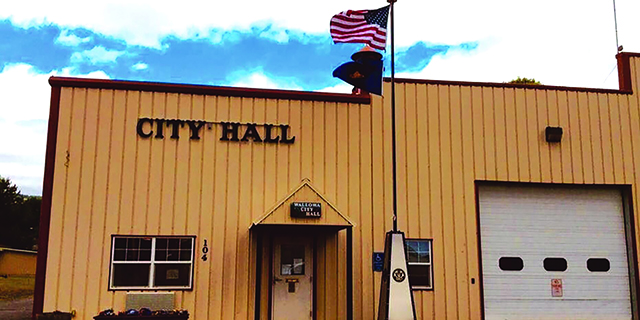Enterprise eyes Main Street revitalization
Published 4:00 pm Wednesday, February 4, 2009

- Timothy Bishop
Nearly 30 people made up the citizen group that enthusiastically hammered out an action plan for Enterprise downtown on Monday.
The week before, a group of approximately 35 Enterprise boosters, including city and county officials, business owners and non-profit directors, had met to prepare for the process of revitalization of the business community. The meetings, organized by City Administrator Michelle Young and co-conducted by city grant writer Marya Nowakowski and assistant Janet Livingston, introduced the assemblage to Oregon State’s Main Street Program. It is the same program that the city of La Grande recently embarked upon.
Trending
“We want to talk about what’s working in our town and build on that,” Young said. “We’re not going to talk about what isn’t working – we’re not going to go there. A common comment I hear right now is ‘we don’t have anything, the stores are closed.’ But if you really take an inventory we are a full service town.”
The inventory taken Monday morning revealed that Enterprise had what several people called “good bones” upon which to build. Furthermore, numerous other studies done in recent years seem to indicate that the city may be in a position to benefit from a confluence of events both good and bad.
“Ever since 9/11 everyone is looking for a place to call home and Enterprise has it,” said Skip Novakovich.
The recession, too, has caused many people to rethink their priorities and the newly published Wallowa County Chamber of Commerce booklet, “Wallowa County: It’s a way of living,” emphasizes the values with which more and more individuals are seeking to reconnect. The booklet will be featured at the popular Wallowa County booth at the Oregon State Fair this coming summer.
“I think there are a lot of people who can live in one place and work in another and basically what we’re selling here in Wallowa County is quality of life,” said County Commissioner Mike Hayward.
Services and opportunities that meet those quality-of-life desires included: a plethora of summer activities; a county-wide interest in keeping private and public properties in good order; exceptionally beautiful county courthouse block; excellent schools; a high-quality hospital and supporting medical services; a pedestrian friendly town; businesses owned by individuals and providing individual customer service; a rich brew of arts opportunities, businesses and events and more.
Trending
“Most of our businesses are locally owned and support our schools and services,” Young reminded the group. “Your downtown provides a sense of community and place. Downtown is a very important part of what makes a community work.”
Additionally, a change in how the county recruits new business-owners appears to hold hope for success.
Commissioner Hayward highlighted the ways in which small communities were different and needed a different economic development model than cities. “Economic development in communities historically has been about recruiting outside the community,” he said. “I think there is a consensus now that that doesn’t work for small communities. The notion of building from within is timely – maybe past time. I think what really brought this notion to the forefront in Wallowa County was the business facilitation program.”
With building from within in mind, Hayward encouraged a focus on the youth of the county. “We graduate 100 kids a year from the high school and they are our best opportunity to grow business in Wallowa County,” he said. “We shouldn’t lose sight of that.”
Hayward is not the only individual to recognize the value of “home grown” businessmen and women. Marketing representative Stacey Green reminded the group that a recent Oregon State University and Stanford University study done by Devora Shamah showed that more than 30 percent of youth in Wallowa County wanted to remain in the county to begin their professional lives and raise their own families. Partly because of that study, Green and others are currently creating a workshop that will show high school students what is available in the county and advise them as to what educational opportunities they need to access to stay in the county.
Several turnkey business opportunities sufficient to support a local family already exist in the city, Nowakowski pointed out. Recent closures including the closure of Radio Shack, the Dollar Store, and OK Theatre were made for personal reasons, rather than economic ones, she said. “Many businesses close for personal reasons. A lot of businesses here support a family and not a lot of other people – that’s one of the things we have to deal with here.”
The process of revitalizing Enterprise downtown and the county is not a “one shot deal” Young warned. “We’re looking at five to 10 years of building,” she said.
However, the quality of the assistance the city has enlisted includes the services of Timothy Bishop, a certified Main Street consultant, paid for by the Oregon Main Street Program. Bishop is the man who helped both Walla Walla and Ellensburg with their downtown development plans. The Main Street program helped the city of Walla Walla take a 33 percent vacancy of downtown storefronts to just three percent vacancy, Bishop said.
The program, which has been successful in 1,600 communities nationwide, has also had good success in Oregon in cities such as Baker City, Corvallis and Albany.
The State of Oregon will provide some funding along the way for consultants and planning and the city will employ Nowakowski’s talents in grant writing as well, Young said. “We’re several years out from developing a budget,” she said, “We need to make use of our volunteers, and Wallowa County historically has a lot of dedicated volunteers.”
Bishop warned the group to keep its focus on action that yielded measurable results. “There will be lots of big issues you want to tackle,” he said. “But this is an incremental program and we’re going to take this in bite-sized pieces.”
The benefit of the Main Street Program over other workshops and studies is that participants do come away with action plans that can be immediately implemented and measured for success, Bishop said. The attendees of the workshop did come away with plans, having identified the top three issues in each of four categories of planning: organization, design, economic restructure, and promotion. A prime concern was that the city had not identified its target market and did not have a cohesive plan to reach that market. “We don’t use our strengths,” said businessman and member of the Economic Action Team Mark Stauffer, “We’re not acting strategically.” Examples of that failing included the failure to lead a captured audience to the downtown. The work-groups consistently listed “quality events” as an asset to the community but also recognized that little effort was made to lure attendees of those events to the downtown area. Event-goers were mostly left to discover the downtown offerings on their own. Another key failure was the failure to utilize the Internet fully. Several attendees told stories of failed attempts to use search engines designed to showcase tourism or relocation to find Enterprise.
Simple solutions, such as putting up a booth filled with information at events, asking event organizers to directly promote downtown businesses over the public address system, and creating downtown activities that partner with the events were discussed as action items.
Committees are now being formed to work on a marketing plan, according to Marya Nowakowski and the findings of the group will be synthesized into a document by March 1.
Enterprise City Administrator Michelle Young was thrilled with the participation on both days of the workshops. “This variety of people is what will make us successful,” she said. “Everyone will find and fill a different place in the organization.”
The next public meeting will be announced. In the meantime, members of city staff and city council will be attending a two-day workshop in La Grande. The workshop, which will examine in detail the four points of the program, is open to any interested person and will be held from 9 a.m. to 4:30 p.m. Feb. 19 and 20 at the F. Maxine and Thomas W. Cook Memorial Library in La Grande.









